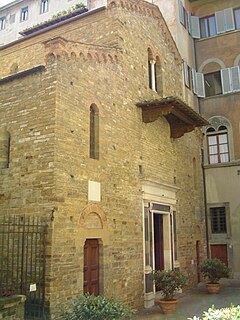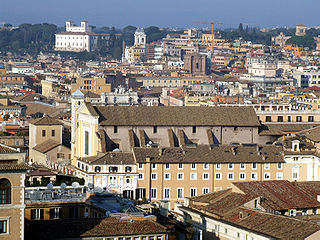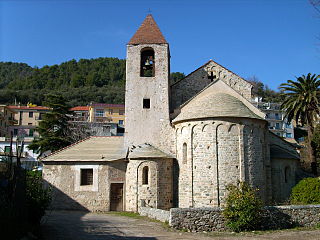
Siena Cathedral is a medieval church in Siena, Italy, dedicated from its earliest days as a Roman Catholic Marian church, and now dedicated to the Assumption of Mary.

The Basilica di Santa Maria Gloriosa dei Frari, usually just called the Frari, is a church located in the Campo dei Frari at the heart of the San Polo district of Venice, Italy. The largest church in the city, it has the status of a minor basilica. The church is dedicated to the Assumption of Mary.

The Church of Santi Apostoli is a Romanesque-style, Roman Catholic church in the historic center of Florence, in the Tuscany region of Italy. It is among the oldest church buildings in Florence.

The Parish Basilica of Santa Maria del Popolo is a titular church and a minor basilica in Rome run by the Augustinian order. It stands on the north side of Piazza del Popolo, one of the most famous squares in the city. The church is hemmed in between the Pincian Hill and Porta del Popolo, one of the gates in the Aurelian Wall as well as the starting point of Via Flaminia, the most important route from the north. Its location made the basilica the first church for the majority of travellers entering the city. The church contains works by several famous artists, such as Raphael, Gian Lorenzo Bernini, Caravaggio, Alessandro Algardi, Pinturicchio, Andrea Bregno, Guillaume de Marcillat and Donato Bramante.

The Minor Basilica of St. Lawrence in Damaso or simply San Lorenzo in Damaso is a parish and titular church in central Rome, Italy that is dedicated to St. Lawrence, deacon and martyr. It is incorporated into the Palazzo della Cancelleria, which enjoys the extraterritoriality of the Holy See.

Andrea di Cristoforo Bregno (1418–1506) was an Italian sculptor and architect of the Early Renaissance who worked in Rome from the 1460s and died just as the High Renaissance was getting under way.

The Spanish National Church of Santiago and Montserrat, known as Church of Holy Mary in Monserrat of the Spaniards is a Roman Catholic titulus church and National Church in Rome of Spain, dedicated to the Virgin of Montserrat. It is located in the Rione Regola, at the intersection of alleway of Via della Barchetta and the narrow Via di Monserrato, with the facade on the latter street, about three blocks northwest of the Palazzo Farnese.

Padua Cathedral, or Basilica Cathedral of Saint Mary of the Assumption, is a Roman Catholic minor basilica and the cathedral located on the east end of Piazza Duomo, adjacent to the Bishop's palace, in Padua, region of Veneto, Italy. The cathedral, dedicated to the Assumption of the Virgin Mary, is the seat of the bishop of Padua. The church building, first erected as seat of a bishop of the diocese in the 4th century, has undergone major reconstructions over the centuries.

San Francesco della Vigna is a Roman Catholic church in the Sestiere of Castello in Venice, northern Italy.

San Marco is a church in Milan, northern Italy.

Fiesole Cathedral, or Cathedral of Saint Romulus of Fiesole,, officially the Cathedral of Saint Romulus of Fiesole, is a Roman Catholic cathedral in Fiesole, Tuscany, central Italy. It is the seat of the Bishop of Fiesole and is dedicated to Saint Romulus.

Pistoia Cathedral, or Cathedral of Saint Zeno is the main religious building of Pistoia, Tuscany, central Italy, located in the Piazza del Duomo in the centre of the city. It is the seat of the Bishop of Pistoia and is dedicated to Saint Zeno of Verona.

Amelia Cathedral is a Roman Catholic cathedral in Amelia in the province of Terni, Umbria, Italy. It was formerly the seat of the Bishop of Amelia, in existence from not later than the 5th century, but since 1983 has been a co-cathedral in the Diocese of Terni-Narni-Amelia.

Ancona Cathedral is a Roman Catholic cathedral in Ancona, central Italy, dedicated to Saint Cyriacus of Ancona. It is the seat of the Archbishop of Ancona. The building is an example of mixed Romanesque-Byzantine and Gothic elements, and stands on the site of the former acropolis of the Greek city, the Guasco hill which overlooks Ancona and its gulf.

The Abbey of Santa Giustina is a 10th-century Benedictine abbey complex located in front of the Prato della Valle in central Padua, region of Veneto, Italy. Adjacent to the former monastery is the basilica church of Santa Giustina, initially built in the 6th century, but whose present form derives from a 17th-century reconstruction.

Santi Dodici Apostoli, commonly known simply as Santi Apostoli, is a 6th-century Roman Catholic parish and titular church and minor basilica in Rome, Italy, dedicated originally to St. James and St. Philip, whose remains are kept here, and later to all Apostles. Today, the basilica is under the care of the Conventual Franciscans, whose headquarters in Rome is in the adjacent building.

The Della Rovere or Saint Jerome Chapel, otherwise the Chapel of the Nativity is the first side chapel in the south aisle of the Basilica of Santa Maria del Popolo in Rome. It was dedicated to the Virgin and Saint Jerome and decorated with the paintings of Pinturicchio and his pupils. It is one of the best preserved monuments of quattrocento art in Rome.

The Cybo or Saint Lawrence Chapel is the second side chapel in the right-hand aisle of the Basilica of Santa Maria del Popolo in Rome. For the beauty of its paintings, the preciousness of marble revetments covering its walls and the importance of the artists involved in its construction the chapel is regarded one of the most significant sacral monuments erected in Rome in the last quarter of the 17th century.

San Paragorio is a church located outside the Medieval walls of the town of Noli, province of Savona. It is an important monument of Romanesque architecture and it is ranked among the most beautiful buildings of this style to be seen in Liguria. It is an Italian national monument since 1890.

The Basilica of Santa Maria della Quercia is a Renaissance-style, Roman Catholic sanctuary church and minor basilica, about two kilometer outside of the center of Viterbo, on the road to Bagnaia, in the Region of Lazio, Italy.




















